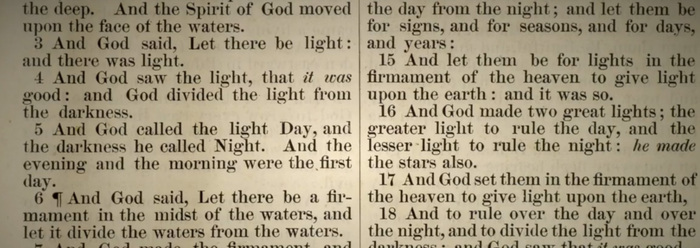"He that planted the ear, shall He not hear? He that
formed the eye, shall He not see?" (Psalm 94:9)
It has become popular among evangelical leaders to hold that God is truly the Creator, but that creation occurred over millions and billions of years. These "semi-creationists" are fond of claiming that the Genesis account only reveals the "fact" of creation, and that God orchestrated it all, but that it does not specify when He created, nor how long He took. Is their position valid? Let's go "back to Genesis" and check it out.
Hypothetically, consider a person fluent in Biblical languages who knows nothing of either Scripture or the various claims regarding the age of things, but who can read, carefully analyze, and understand a written document. Given the Bible for the first time, such a reader would certainly understand Genesis 1-11 to teach that creation occurred only thousands of years ago, not millions or billions, and he would cite several reasons.
He would note that the word "day" (Hebrew, yom) in Genesis 1 is best understood as a literal day (either a 24-hour day or the daylight portion of a day). While this common word can mean an indefinite time period, it almost always means a literal day and is so defined the first time it is used in Genesis 1:4,5. Furthermore, it always means a literal day when modified by a number (i.e., 2nd day) or evening and/or morning, as it is in Genesis 1. To cap it off, it always means a literal day when used in the plural form (i.e., six days of creation, Exodus 20:11).
Next, he would note the narrative character of those early chapters. They are telling a story, and there is no indication that it is figurative. He would find the poetic portions are no less "historic" than the prose portions. It all appears to be chronological, with each event followed by another.
For instance, every verse in Genesis 1 starts with the conjunction "and." The entire chapter is one run-on sentence, with no hint of major time gaps. The remaining chapters use a similar format, implying an orderly sequence of events.
As a matter-of-fact, of the 299 verses in Genesis 1-11, 32% contain "time" words, such as "days, weeks, or years." Also, 49% of the verses contain some sort of "sequence" words such as "and" or a resulting action verb. Of the remaining 19% which don't contain such words, most amplify the thought in the previous verse which does mention time or sequence. There can be no doubting the Bible's intention to communicate the "when" and duration of creation.
Genealogical records dominate two complete chapters, 5 and 11. There is no hint that these lists are mythological. It's as if the Author wanted us to know this information and knew that there was no other way for us to obtain it, so He told us in no uncertain terms.
Our hypothetical reader would no doubt conclude that Genesis, coupled with the rest of Scripture, clearly teaches that God created, cursed, and flooded all things only thousands of years ago.
To modern old-earth "semi-creationists," whether theistic evolutionists, progressive creationists, or day-age advocates, he would say: "You may choose not to believe what is written here, but if so you should cease deceiving yourselves and others by using the term 'Bible-believer' to describe your position."














